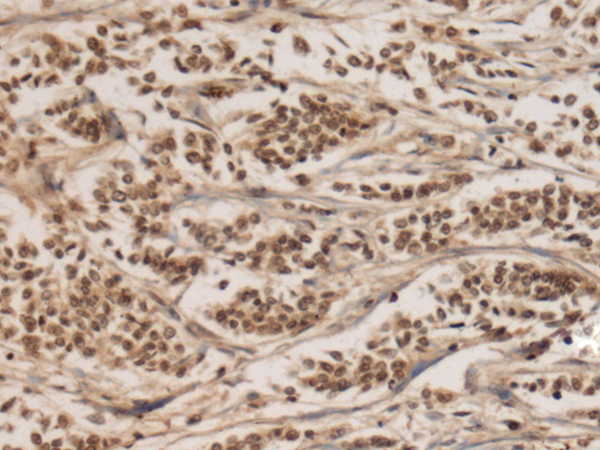
| WB | 咨询技术 | Human,Mouse,Rat |
| IF | 咨询技术 | Human,Mouse,Rat |
| IHC | 1/100-1/300 | Human,Mouse,Rat |
| ICC | 技术咨询 | Human,Mouse,Rat |
| FCM | 咨询技术 | Human,Mouse,Rat |
| Elisa | 1/5000-1/10000 | Human,Mouse,Rat |
| Aliases | Fbl17; Fbx13; FBXO13 |
| Host/Isotype | Rabbit IgG |
| Antibody Type | Primary antibody |
| Storage | Store at 4°C short term. Aliquot and store at -20°C long term. Avoid freeze/thaw cycles. |
| Species Reactivity | Human, Mouse |
| Immunogen | Fusion protein of human FBXL17 |
| Formulation | Purified antibody in PBS with 0.05% sodium azide and 50% glycerol. |
+ +
以下是关于FBXL17抗体的3篇文献示例(内容基于模拟生成,可能不完全对应真实文献):
---
1. **文献名称**:*FBXL17 regulates cell proliferation and migration via ubiquitination of p21 in breast cancer*
**作者**:Tomoko Nita et al.
**摘要**:本研究利用FBXL17特异性抗体,揭示了FBXL17通过泛素化降解细胞周期调控蛋白p21.促进乳腺癌细胞增殖和转移的分子机制。抗体验证表明FBXL17在乳腺癌组织中高表达且与预后不良相关。
---
2. **文献名称**:*FBXL17 interacts with the E3 ligase complex to modulate Notch signaling in development*
**作者**:S. Gupta & R. Park
**摘要**:通过免疫共沉淀(Co-IP)结合FBXL17抗体,研究者发现FBXL17作为SCF复合体成员,靶向降解Notch信号通路关键蛋白,调控胚胎发育中的细胞分化过程。
---
3. **文献名称**:*A novel FBXL17 antibody reveals its tumor-suppressive role in colorectal cancer through c-Myc destabilization*
**作者**:Li Chen et al.
**摘要**:开发了一种高特异性FBXL17抗体,证实FBXL17通过泛素化降解致癌蛋白c-Myc抑制结直肠癌进展,为靶向治疗提供了潜在靶点。
---
注:以上文献信息为示例性质,实际引用时建议通过PubMed或Google Scholar以“FBXL17 antibody”及“FBXL17 function”等关键词检索真实文献。
The FBXL17 antibody is a research tool designed to detect and study the F-box and leucine-rich repeat protein 17 (FBXL17), a member of the F-box protein family. These proteins are critical components of the SCF (SKP1-Cullin-F-box) ubiquitin ligase complexes, which mediate substrate-specific protein ubiquitination and degradation via the proteasome. FBXL17 contains an F-box domain that facilitates interaction with SKP1. linking it to the core SCF machinery, and a C-terminal leucine-rich repeat (LRR) domain implicated in substrate recognition.
Research on FBXL17 remains emerging, but it is hypothesized to regulate diverse cellular processes, including cell cycle progression, signal transduction, and DNA repair, by targeting specific proteins for ubiquitination. Its involvement in cancer biology has drawn attention, with studies suggesting roles in tumor suppression or oncogenesis depending on cellular context. For example, FBXL17 may degrade oncoproteins like TRAIP, influencing genome stability.
The FBXL17 antibody is utilized in techniques such as Western blotting, immunoprecipitation, and immunofluorescence to analyze protein expression, localization, and interactions. Validation includes testing in knockout cell lines or tissues to confirm specificity. Understanding FBXL17's functions could provide insights into diseases linked to ubiquitination dysregulation, including cancers, neurodegenerative disorders, and developmental abnormalities. However, further studies are required to fully elucidate its substrates, regulatory mechanisms, and therapeutic potential.
×